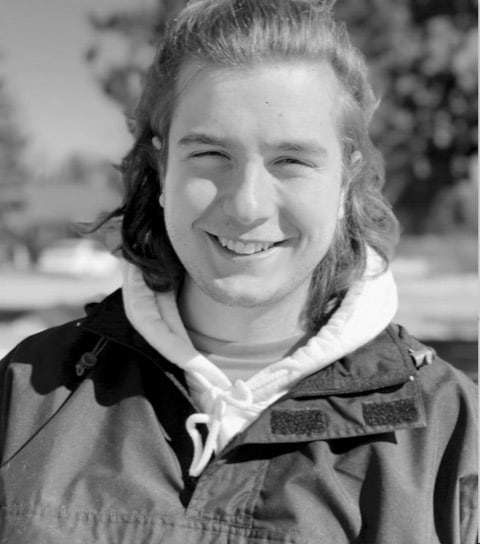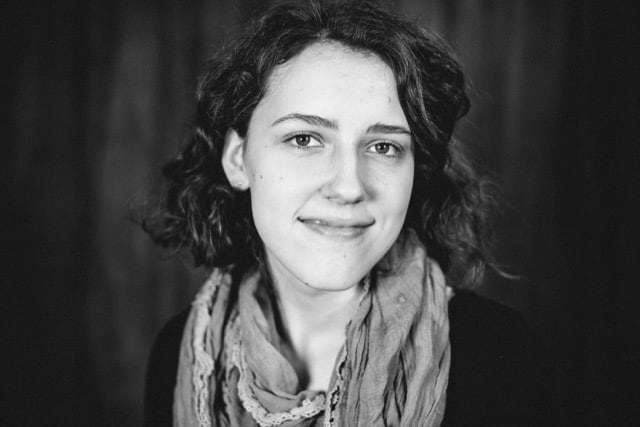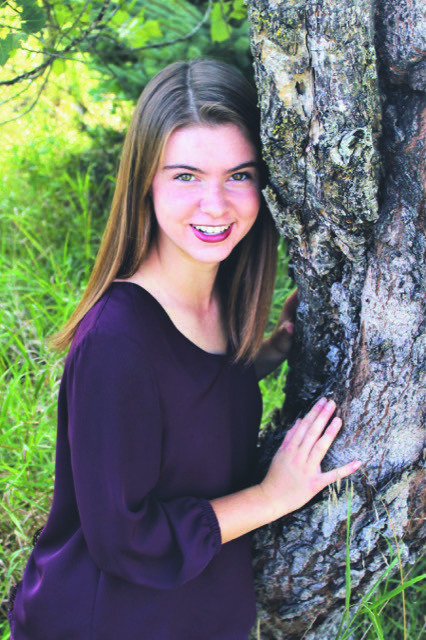
Cole Simon
Traverse City West Senior High School
William R. Montgomery Fiction Scholarship Award
The Lost Titan
Jace wrapped his cloak tighter around his torso. Not for comfort, but to prevent the various weapons strapped to him from clanking against the armor. It didn’t matter really; the only people for miles were those accompanying him up the mountain. He doubted they noticed, much less even minded, as they were all doing their best to trudge along the treacherous path. Regardless of whether they noticed or not, Jace was not about to let himself become sloppy. He was following along the rear of the pack, a few paces behind the second to last. The party consisted of his master, Vaeling, and a group of six local Sherpas he had hired to accompany him through the Giant’s Maw. At least, that’s why they thought they were hired.
It wasn’t much longer until the party crested the mountain they had been hiking for the past few days. The weeks leading up to this had been exhausting. Long days of trudging through feet-deep, unbroken snow on paths that frequently consisted of nothing more than an eighteen-inch wide game trail. But they finally made it to the real destination. In the distance, just across one of the dozens of valleys separating the “teeth” in the Giant’s Maw, the party spotted it. A skeleton of titanic proportions—a relic of a long-forgotten age, where battles were fought by beings reminiscent of the Elder Gods. This titan had apparently lost its battle, as a sword nearly a league in length protruded from its torso, right where its heart would be if it were human. This is why Vaeling had dragged Jace and the village Sherpas all this way.
Vaeling ordered the hired hands to set up camp in a relatively spacious flat piece of mountain, much to their annoyance. As far as they knew, they were wasting a wonderful travel day. Aside from a wind, the weather was considerably better than it had been for days.
After half an hour, camp was complete and the Sherpas had retreated to the fire to play Mait’traan, a local card game. Vaeling had secluded himself to his tent as soon as it was up, and Jace went in after all of the other work had been completed. Vaeling was completely surrounded by ancient scrolls and tomes, strange pendants and ancient relics that seemed to whisper to you if you turned your back to them for too long.
“How much longer until you begin the ritual?” Jace asked.
“Jace, what have I told you about speaking to me,” Vaeling demanded.
“I would prefer the life of eternal suffering you’ve threatened as opposed to referring to you as master every time I address you,” remarked Jace.
“Yes, well, if I weren’t so busy with this I could see about fulfilling your request,” muttered Vaeling.
“Which brings me back to my original question, master. How much longer until you’re ready to begin? Because each moment we spend waiting is another moment for me to lament the work you’ve forced me to aid you with,” Jace said, his voice rising with each word.
“Mind your tone, boy. While this work is far more significant than you, I won’t tolerate your jibes indefinitely. I can always enslave another muscled goon with a sword. But if you must know, I’m already set to begin. We must simply wait for the sun to align with the skeleton’s head. I’m simply engaging myself in some side projects to pass the time,” replied Vaeling distractedly, already returning his attention to one particularly sinister looking tome.
Jace knew this conversation was over, so he retreated to his tent to try and grab some rest. To calm himself, he began to sharpen his dagger, purely for meditation, as all his weapons were already exceedingly lethal. Soon he drifted into a restless sleep.
As the sun started its descent across the pale sky, Jace felt a shift in the air. Not the wind changing, but something inexplicable, something primeval and sinister. He roused himself from his rest, and geared himself before exiting his tent. Vaeling was sitting at the edge of the cliff, eagerly watching the day slowly end, while clutching a box as though it contained his very being.
When he finally noticed Jace standing directly behind him, Vaeling rose, and started back for the center of camp. Once there, he started clearing everything out of a ten-foot circle.
Vaeling finished just as the sun was reaching the skeleton’s head. Slowly and deliberately, Vaeling snapped open the worn clasps of the chest, which burst open and began emitting an ominous gas, which oozed over the edges and started to form a dense fog that threatened to rise higher than Vaeling’s waist. Jace watched with anticipation as the sun crept ever closer to its destination.
Aside from his almost imperceptible muttering, Vaeling had been utterly still since he opened the box. But as the sun was halfway down the skull, Vaeling suddenly whipped his head up to gaze at the Sherpas, who had been watching him uneasily. He began loudly chanting in some ancient forgotten language; the words he spoke summoned chains from the fog which bound each Sherpa by their wrists, ankles, and necks. Terror swept across their faces as they struggled, but some arcane force prevented a scream from passing their lips. The invisible force which bound the men then began dragging the men and placing them around a circle inside the larger one Vaeling had cleared only moments before.
Jace could do nothing but watch this happen. He was bound to Vaeling as an undead servant, forbidden to do anything against his master’s wish. Every fiber in his being urged him to draw a sword and help the innocent men, but something stronger held him in place.
Once the men were placed equally around a circle, etchings began appearing in the stone, emitting a faint, ethereal glow. More shapes and intricate designs started carving themselves into the stone. After a few moments of this demonic carving, everything went still again. It was naught but a brief pause, as no sooner did it start than each man began getting sucked into the mountain itself. They struggled in vain, and Jace could hardly bear to watch as Vaeling sacrificed the lives of six so easily, all for his personal gain.
As the last man disappeared into the fog, Vaeling’s box began emitting a shriek. It grew louder and louder, its pitch ever rising, until Jace was sure his eardrums would burst. When it could apparently get no louder, a blur of shadow leapt from the box to the middle of the intricate weave that was created where the men were only minutes ago. After the shadow had been summoned, Vaeling ceased his chanting, and the fog slowly started receding back into the box.
Creatures appeared, seemingly created by the smoke. As soon as Jace thought he discerned a figure in the smoke, is would form something new, something even more horrendous. It turned to face Vaeling after a moment, and smiled.
“I am impressed with your talent, wicked one. It has been many millennia since I have been summoned, and many more since a mortal has completed such a task. While I do applaud you, I know you didn’t go through all of this effort for my praise alone. So I ask you, what do you require of me? Think hard before answering for I will grant only one request,” bellowed the demon in an unnaturally loud and commanding voice for one so small.
“Oh great Kebrachan, swallower of nations, scourge of purity, conqueror of realms, I have but one request that is humiliatingly easy for one with power as great as you. I wish for you to resurrect the titan Uthraain, King of Storms, who was slain behind us by the wretched angel Glyphus. I wish for you to resurrect him and give me control over him, so that I am his unquestioned master,” replied Vaeling
The demon smirked. “I see you’ve done you research and learned of my weakness to flattery. Very well. I shall do as you ask and be on my way. And since you amuse me mortal, I will offer some advice. Be careful how deep you delve into the mind of one so ancient and grand as Uthraain. Few have come out of such a place, and none who do retain any of their sanity.” said Kebrachan, with a frightening tinge of amusement as he uttered the final words.
Kebrachan began losing any sort of form he had retained when speaking to Vaeling and Jace. He began growing, expanding until he reached the edge of the circle which confined him. When he was as large as he could grow, he began glowing bright white, and emitting such powerful energy Jace had to turn away. What he saw astounded him.
The great skeleton was beginning to grow flesh onto its ancient bones. As it regenerated, it grabbed the mighty sword with both hands and removed it from both its chest and the mountain behind. The resulting sound was deafening, even from so many miles. As it began to form near fully, it stood, leaning heavily on the sword for a time. After what seemed like less than a minute, Jace was staring at something far more primitive, yet far more refined than man. He was staring at a titan.
“Now Jace,” Vaeling said with a terrifying look of hunger on his face. “Now we can begin.”

Madelynne Gregory
St. Mary’s Lake Leelanau School
Front Street Writer/Career Tech Center
Community Foundation Leslie Lee Nonfiction Scholarship Award
Mara White’s Delivery
Mara White remembers that there was blood. Quite a lot of blood. Covering the white hospital sheets, dripping to the floor. A puddle of red, frantic doctors covered in it, screaming for the anesthesiologist, STAT! STAT! Blood pouring out of Mara, her newborn baby on her chest, wrinkled and pink and just minutes old, Mara’s husband James watching it all happen from across the room. The blood wouldn’t stop. The anesthesiologist wouldn’t come. The baby and the husband were hurried from the room. Mara White was dying.
Going into her first birth, Mara says, “I was so cocky.” She was thirty years old, this was her first child, and she was determined to do it all naturally— no medicine, no IV, no surgery, just her and the baby. It was a sweltering June day, 90-plus degrees, and the elementary school teacher was sent walking outside the University of Michigan hospital for hours to induce labor. She was sent home, then rushed back. At this point, Mara was ready, and felt little anxiety about the impending birth. “I was sick of being pregnant…I just wanted her [the baby] to come out.”
When labor finally did come, it was fast. Within two hours, in the early hours of June eighteenth, Louisa Marie entered the world. Labor was difficult— Mara vomited all throughout, making her dehydrated—but the baby was healthy, and that was what mattered. Louisa was placed on Mara’s chest, just like Mara had read that was essential for mother-child bonding. All was well—on the surface. “I was young and dumb…I never considered all that could go wrong,” said Mara. “It never dawned on me, never.”
But, as it would happen, Mara had a genetic bleeding disorder, one that neither she nor the doctors knew about. Most of the time, von Willebrand’s disease is no big deal. Roughly 1% of the population walks around with the blood-clotting deficiency, and most never know they have it. A person with von Willebrand’s might need extra Band-Aids after the first two are soaked through, might have bruises cover her legs and not know where she got them, might have gum bleeding for five minutes after brushing her teeth with too much gusto. Having the condition also means a ton of nose bleeds, and prolonged paper-cut episodes. But von Willebrand’s is by no means a grave disease— except when childbirth is concerned.
Minutes after birth, Mara started bleeding. Internally, externally, heavily, and very, very, quickly. Within moments, her condition was deemed critical. The doctor was asking her questions, and she struggled to respond. Soon, she couldn’t speak at all. Her vision went black and white, then tunnel. The doctor’s voice was rising, growing angry, more and more panicked, unable to hurry the arrival of the anesthesiologist, unable to do anything to stop the blood from gushing out of the young mother. And it was gushing in gallons, like something out of an R-rated horror movie. But this was all too real— Mara was dying in childbirth.
Suddenly, Mara could see everything from above, hovering over the hospital room as a spirit or a ghost, or maybe as a woman who is leaving the world. She could see it all: the beige hospital room tainted with red, the doctors huddled over her body, her husband and daughter a few corridors away with the nurse. She remembers being calm, eerily peaceful about death— matter-of-fact, even. She remembers thinking forward, to what comes next— then pausing to look back. She thought of the students in her first-grade classroom, waiting for Mrs. White to return from maternity leave. She thought of her husband James, knowing nothing about diapers or milk or crying or girls, widowed after only five blissful years, left to brave fatherhood alone. Most of all, she thought of her baby. Louisa, growing up without a mother to read her stories and teach her to play the flute and hold her when she cried. Mara remembers saying a simple prayer then, a prayer that went something like: God, I know Louisa needs me. I know James needs me. I know I still have more to do for kids. I’m not ready.
As soon as she finished the words, the anesthesiologist arrived, his hair sticking up all over, having clearly just gotten out of bed. He inserted the IV into both of Mara’s elbows, making a popping sort of sound. Mara returned to her body, bewildered and blood-covered but so, so grateful to be back.
The doctor who oversaw Mara’s birth visited her later, once the blood had been cleared up but the shock had not. “You know you were dying,” he said, his face egg-white, and Mara nodded. The doctor told her that he had never lost a patient before, and that this had just been too close a call, thank you very much. He resigned immediately— she was his last patient. Mara’s nurse never let another patient give birth without an IV again. The experience horrified the young nurse, and still haunted her with nightmares many years later.
The aftermath of the birth was not easy for Mara, either. She began to hemorrhage as soon as she returned from the hospital, nursing was difficult, and Louisa didn’t gain enough weight for a while. “It was not what you imagined having a baby was like,” Mara said. “It was quite hellish.” For some time, she didn’t tell relatives and friends that she had come so close to death. She recalls that people would come and visit her after the birth, and that they would fret over her pale complexion, asking, “Are you sure you’re all right?” But Mara was still dealing with her own emotions, and didn’t want to have to confront those of others. It was six months before she even discussed her near-death experience with her husband.
But Mara does not shy away from talking about the ordeal now. She does it annually, in fact. Every year on June 18, Louisa Marie White turns a year older: one, then two, and now, somehow, nineteen. Friends and family, but mostly family, gather around the cake, sometimes chocolate, sometimes coffee-flavored, frosting always melting a little in the early summer heat. Forties big-band horns and dramatic soundtrack violins play back to back from Louisa’s computer, showing off the birthday girl’s eclectic taste in music. I am often the one taking pictures, and I see it all. I see that underneath the party hats, Louisa’s hair is as dark as Mara’s, though a little curlier. I see that as mother and daughter embrace, Mara’s eyes sparkle with unshed tears that could be from something sad, but that are probably from joy. I see brown curls framing six ice cream-covered faces, including my own. I see my dad as a father of seven, rather than of one. Louisa’s birthday is a day to celebrate that we’re all alive, really. That our family of eight was even possible. For after a delivery that so very nearly killed her, my mother has gone on to give birth to not one more, not two more, but six more children. We owe our lives and our family to those doctors and that conversation with God—and most importantly, to our mother.
It certainly would have been enough for my mom to love one child and raise her well, to teach Louisa to have her mother’s faith and kindness and gratitude. But instead, she had five more. Instead of lecturing us about God and love, she does something far more difficult: she leads by example. Mindful of the promise she made in the delivery room, my mom began to do more to help children, to make more of an impact on the world. After earning her Ph.D. in Child Development, she’s taught classes, written textbooks, appeared at conferences, and started a program for kids in poverty. And then she’s left it all behind, multiple times, hard-won years of experience and prestige, to raise her children.
As Mara’s daughter, I see firsthand her utter gratitude and delight in life, and daily striving to help others. She is the first person to gape at the unusual shade of orange in the sky, or to notice an infant’s giggle while waiting in line with groceries. Often, she is the only person to stop and talk to a homeless person on the street, or to be moved to tears by a simple story on the radio. She shows the same tenderness and love as mother to her children. When I was little, I remember her making up songs while she stirred macaroni and cheese or washed me in the tub. I remember her letting me sleep in her queen-sized bed every single night when I was small, even when she had two brand-new, screaming, tiny twin babies to look after. A decade later, I see her coax my youngest sister to sleep with elaborate stories about superheroes, see her teach a five- year-old and a ten-year-old how to frost pine cones with peanut butter and birdseed to make bird feeders. I see her teach me to drive, enduring too many jolts and near-misses but brushing it off afterwards. I see her stay up until midnight sorting books for her nonprofit, then wake up at six to make pancakes and send her children off to school. And through it all, I see her take pleasure from every moment of her life, from the mundane to the marvelous.
It would be difficult, if not impossible, to have a near-death experience like that of Mara’s and have no changed ideas of God and spirituality. My mom says that she’s a lot more confident in her beliefs now. But instead of feeling a need to evangelize, she lives her faith every day in her treatment of others. In infusing kindness into the many lives that she has touched— people who come to food pantries, elementary school children, her former college students, and most of all, her children—she more than fulfills her divine pact of two decades ago. As I am nearing adulthood myself, I can only hope that I touch the world in a fraction of the way that my mother, Mara White, has. Mother Teresa is her idol, and on the bottom of all of her emails is a quote: Do small things with great love. I hope that I can do the same.

Hannah Riffell
Elk Rapids High School
Robert and Marcy Branski Poetry Scholarship Award
Vicksburg, 2014
O, what these Southern hills have seen,
Is now embalmed in evergreen.
Standing here, one could not know
What happened once, in this still scene.
For buttercup and white yarrow,
Over the native grasses grow,
As garlands on a casket lay
To hide all trace of Death below.
And yet the River, dark as clay,
Still runs unbridled on its way,
Though for its sake, was blood released
And men now under stone decay.
These haunted hills, all sound did cease
Save for the sweep of willow trees-
A silence mistaken for peace.
This silence, mistaken for peace.

